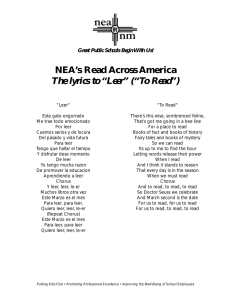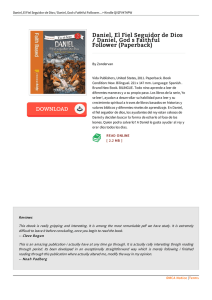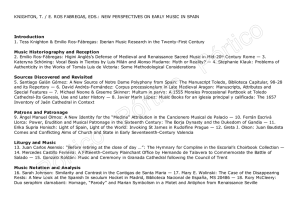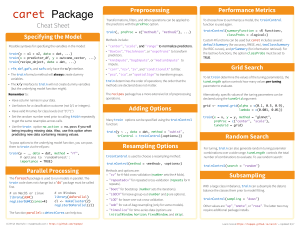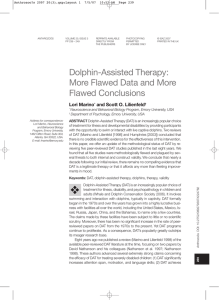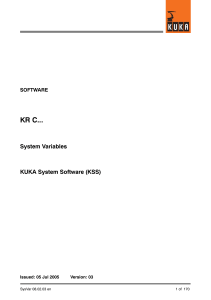Peruvian Spanish
Anuncio
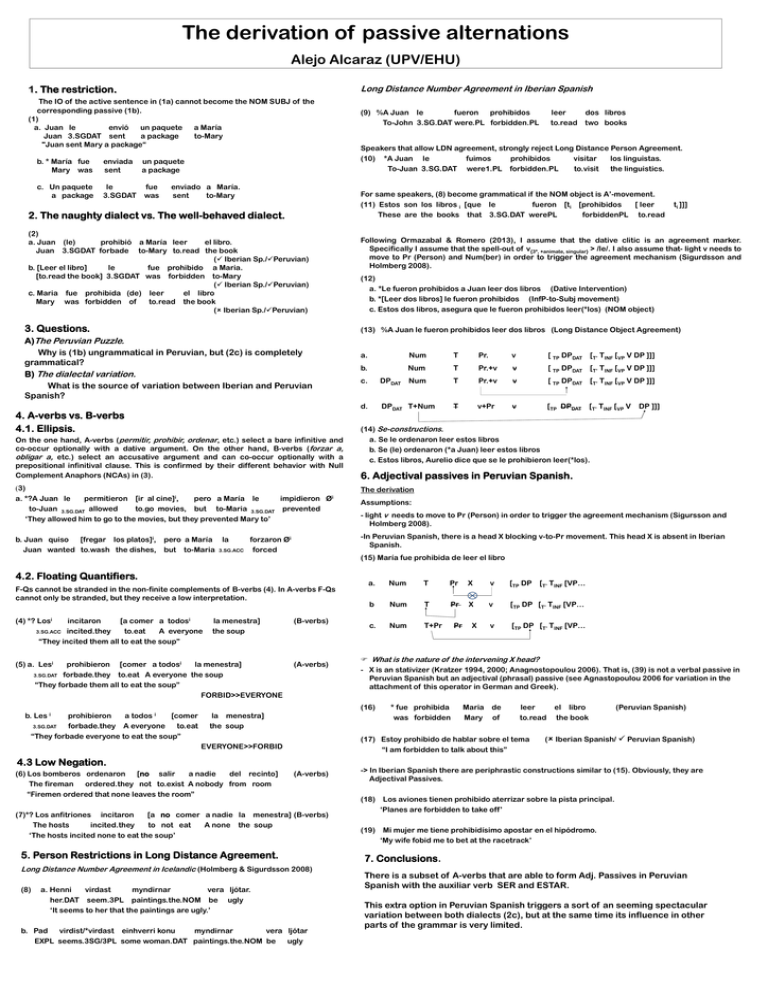
The derivation of passive alternations
Alejo Alcaraz (UPV/EHU)
Long Distance Number Agreement in Iberian Spanish
1. The restriction.
The IO of the active sentence in (1a) cannot become the NOM SUBJ of the
corresponding passive (1b).
(1)
a. Juan le
envió
un paquete a María
Juan 3.SGDAT sent
a package
to-Mary
"Juan sent Mary a package“
b. * María fue
Mary was
enviada
sent
c. Un paquete
a package
le
3.SGDAT
un paquete
a package
fue
was
enviado a María.
sent
to-Mary
(9) %A Juan le
fueron prohibidos
To-John 3.SG.DAT were.PL forbidden.PL
leer
dos libros
to.read two books
Speakers that allow LDN agreement, strongly reject Long Distance Person Agreement.
(10) *A Juan le
fuimos
prohibidos
visitar
los linguistas.
To-Juan 3.SG.DAT were1.PL forbidden.PL
to.visit the linguistics.
For same speakers, (8) become grammatical if the NOM object is A’-movement.
(11) Estos son los libros i [que le
fueron [ti [prohibidos
[ leer
These are the books that 3.SG.DAT werePL
forbiddenPL to.read
2. The naughty dialect vs. The well-behaved dialect.
(2)
a. Juan (le)
prohibió a María leer
el libro.
Juan 3.SGDAT forbade to-Mary to.read the book
( Iberian Sp./Peruvian)
b. [Leer el libro]
le
fue prohibido a Maria.
[to.read the book] 3.SGDAT was forbidden to-Mary
( Iberian Sp./Peruvian)
c. Maria fue prohibida (de) leer
el libro
Mary was forbidden of
to.read the book
( Iberian Sp./Peruvian)
3. Questions.
ti ]]]
Following Ormazabal & Romero (2013), I assume that the dative clitic is an agreement marker.
Specifically I assume that the spell-out of v{3ª, +animate, singular} > /le/. I also assume that- light v needs to
move to Pr (Person) and Num(ber) in order to trigger the agreement mechanism (Sigurdsson and
Holmberg 2008).
(12)
a. *Le fueron prohibidos a Juan leer dos libros (Dative Intervention)
b. *[Leer dos libros] le fueron prohibidos (InfP-to-Subj movement)
c. Estos dos libros, asegura que le fueron prohibidos leer(*los) (NOM object)
(13) %A Juan le fueron prohibidos leer dos libros (Long Distance Object Agreement)
A)The Peruvian Puzzle.
Why is (1b) ungrammatical in Peruvian, but (2c) is completely
grammatical?
B) The dialectal variation.
What is the source of variation between Iberian and Peruvian
Spanish?
4. A-verbs vs. B-verbs
4.1. Ellipsis.
On the one hand, A-verbs (permitir, prohibir, ordenar, etc.) select a bare infinitive and
co-occur optionally with a dative argument. On the other hand, B-verbs (forzar a,
obligar a, etc.) select an accusative argument and can co-occur optionally with a
prepositional infinitival clause. This is confirmed by their different behavior with Null
Complement Anaphors (NCAs) in (3).
a.
Num
T
Pr.
v
[ TP DPDAT
[T’ TINF [VP V DP ]]]
b.
Num
T
Pr.+v
v
[ TP DPDAT
[T’ TINF [VP V DP ]]]
Num
T
Pr.+v
v
[ TP DPDAT
[T’ TINF [VP V DP ]]]
T
v+Pr
v
[TP DPDAT
[T’ TINF [VP V
c.
DPDAT
d.
DPDAT T+Num
DP ]]]
(14) Se-constructions.
a. Se le ordenaron leer estos libros
b. Se (le) ordenaron (*a Juan) leer estos libros
c. Estos libros, Aurelio dice que se le prohibieron leer(*los).
6. Adjectival passives in Peruvian Spanish.
(3)
a. *?A Juan le
permitieron [ir al cine]i,
pero a María le
impidieron Øi
to-Juan 3.SG.DAT allowed
to.go movies, but to-Maria 3.SG.DAT prevented
‘They allowed him to go to the movies, but they prevented Mary to’
The derivation
b. Juan quiso
[fregar los platos]i, pero a María la
forzaron Øi
Juan wanted to.wash the dishes, but to-Maria 3.SG.ACC forced
-In Peruvian Spanish, there is a head X blocking v-to-Pr movement. This head X is absent in Iberian
Spanish.
F-Qs cannot be stranded in the non-finite complements of B-verbs (4). In A-verbs F-Qs
cannot only be stranded, but they receive a low interpretation.
incitaron
[a comer a todosi
3.SG.ACC incited.they
to.eat
A everyone
“They incited them all to eat the soup”
(5) a.
Lesi
la menestra]
the soup
todosi
prohibieron [comer a
la menestra]
3.SG.DAT forbade.they to.eat A everyone the soup
“They forbade them all to eat the soup”
FORBID>>EVERYONE
- light v needs to move to Pr (Person) in order to trigger the agreement mechanism (Sigursson and
Holmberg 2008).
(15) María fue prohibida de leer el libro
4.2. Floating Quantifiers.
(4) *? Losi
Assumptions:
(B-verbs)
(A-verbs)
a.
Num
T
Pr
X
v
[TP DP
b
Num
T
Pr
X
v
[TP DP [T’ TINF [VP…
c.
Num
T+Pr
v
[TP DP [T’ TINF [VP…
prohibieron
a todos i
[comer
3.SG.DAT
forbade.they A everyone
to.eat
“They forbade everyone to eat the soup”
la menestra]
the soup
4.3 Low Negation.
(A-verbs)
(7)*? Los anfitriones incitaron
[a no comer a nadie la menestra] (B-verbs)
The hosts
incited.they
to not eat
A none the soup
‘The hosts incited none to eat the soup’
5. Person Restrictions in Long Distance Agreement.
Long Distance Number Agreement in Icelandic (Holmberg & Sigurdsson 2008)
(8)
* fue prohibida
was forbidden
Maria de
Mary of
leer
to.read
(17) Estoy prohibido de hablar sobre el tema
“I am forbidden to talk about this”
EVERYONE>>FORBID
(6) Los bomberos ordenaron [no salir
a nadie
del recinto]
The fireman ordered.they not to.exist A nobody from room
“Firemen ordered that none leaves the room”
X
What is the nature of the intervening X head?
- X is an stativizer (Kratzer 1994, 2000; Anagnostopoulou 2006). That is, (39) is not a verbal passive in
Peruvian Spanish but an adjectival (phrasal) passive (see Agnastopoulou 2006 for variation in the
attachment of this operator in German and Greek).
(16)
b. Les i
Pr
a. Henni
virdast
myndirnar
vera ljótar.
her.DAT seem.3PL paintings.the.NOM be ugly
‘It seems to her that the paintings are ugly.’
b. Pad
virdist/*virdast einhverri konu
myndirnar
vera ljótar
EXPL seems.3SG/3PL some woman.DAT paintings.the.NOM be ugly
[T’ TINF [VP…
el libro
the book
(Peruvian Spanish)
( Iberian Spanish/ Peruvian Spanish)
-> In Iberian Spanish there are periphrastic constructions similar to (15). Obviously, they are
Adjectival Passives.
(18) Los aviones tienen prohibido aterrizar sobre la pista principal.
‘Planes are forbidden to take off’
(19) Mi mujer me tiene prohibidísimo apostar en el hipódromo.
‘My wife fobid me to bet at the racetrack’
7. Conclusions.
There is a subset of A-verbs that are able to form Adj. Passives in Peruvian
Spanish with the auxiliar verb SER and ESTAR.
This extra option in Peruvian Spanish triggers a sort of an seeming spectacular
variation between both dialects (2c), but at the same time its influence in other
parts of the grammar is very limited.
